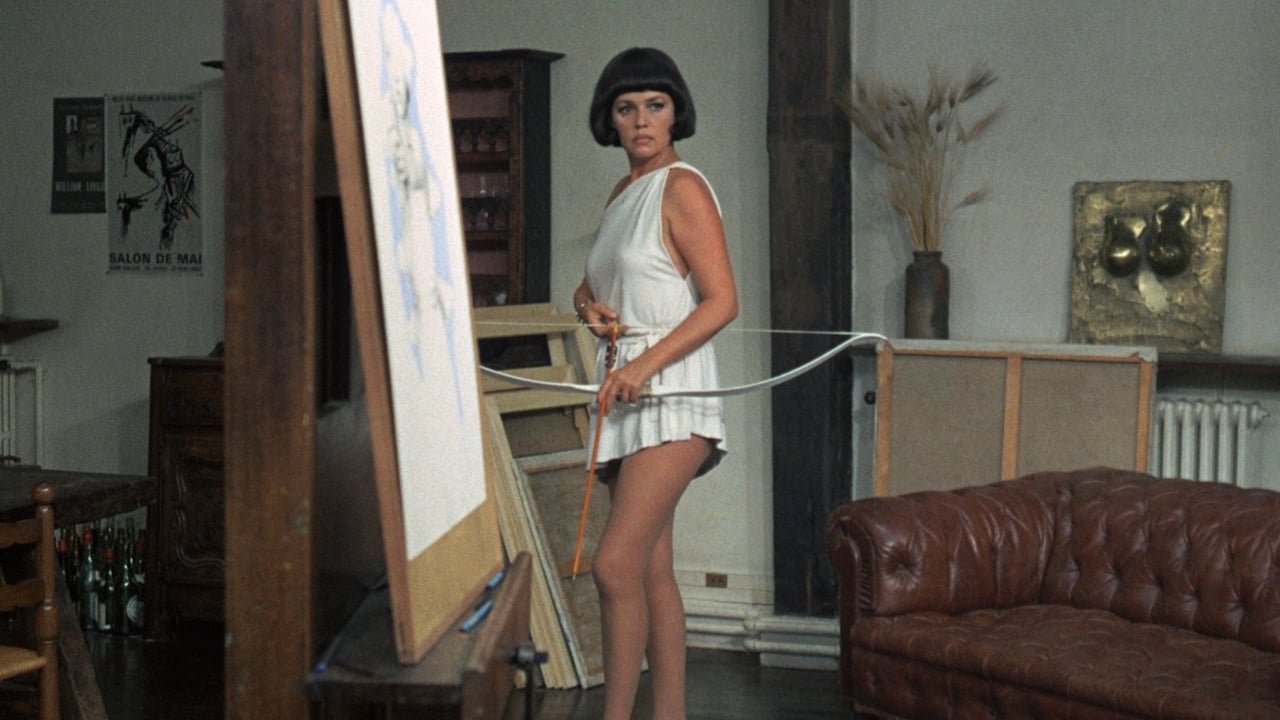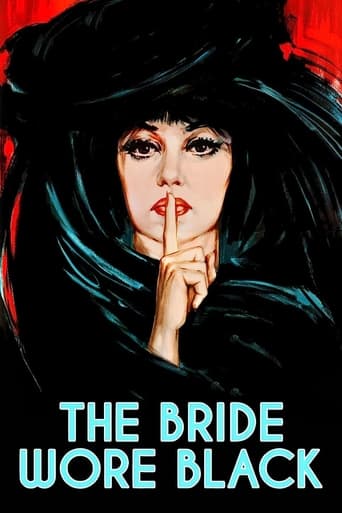

Some things I liked some I did not.
... View MoreReally Surprised!
... View MoreI gave this film a 9 out of 10, because it was exactly what I expected it to be.
... View MoreThe film makes a home in your brain and the only cure is to see it again.
... View MoreAfter watching auteur film maker François Truffaut's Film Noir Shoot the Pianist I decided to take a look at his IMDb page,where I spotted a revenge psychological Film Noir Thriller which appears to have "inspired" a number of recent movies.With Truffaut being a pretty big name,I was surprised that the only DVD (with English Subtitles) out was a French import edition,which led to me getting ready to lift the veil of the bride.The plot:Attempting suicide by diving out of a window, Julie Kohler is stopped by her mum.Gathering her composure,Kohler gathers a notebook with five names and 5 piles of cash.Packing everything up,Kohler tells her mum that she is going on a long holiday.Visiting a luxury apartment block,Kohler gets the person at the front desk to reveal when and where a man called Bliss is having his stag party.Greeting all the guests at his stag party,Bliss finds his eyes being drawn to a mysterious women.Unable to take his mind off the women, (who none of the guests recognise) Bliss decides to go up and talk to her.Introduceing herself,Kohler gets Bliss to join her on the balcony,so that they can speak privately.Whilst Bliss says that he has never seen her before,Kohler puts her scarf round a tree in front of the balcony,and tells Bliss to climb over and get it.As Bliss climbs over the balcony,Kohler reveals that they actually met 5 years ago at her wedding,and pushes Bliss to his death. Leaving Bliss's dying stag party behind,Kohler sets her sights on giving four other men a late wedding present from a dressed in black bride.View on the film:Married to a "troubled" legacy, (from Truffaut & cinematographer Raoul Coutard having vicious arguments over the style of the movie for the whole production,which led to lead Jeanne Moreau having to direct the rest of the cast,to Trauffaut to later calling the title "A disappointment"!) Truffaut is still able to serve up a smoking hot dish of revenge.Whilst not featuring as much social commentary as his "French New Wave" work, Truffaut & Jean-Louis Richard's adaptation of Cornell Woolrich's novel does slyly make each of the 5 guys on Kohler's death wish list be rooted in cosy upper/middle- class lifestyles,with the "tidy" image that they all offer allowing each of them to cover their deadly pasts.Taking an episodic approach to Kohler's revenge,the writers brilliantly take their time in allowing Kohler's attacks to become increasingly harsh,with Kohler's initial playfulness being burnt away to reveal a merciless femme fatale.Spending time with each of the 5, Truffaut and Richard give each segment its own unique Neo- Noir edge,from Delvaux's grubby car dealing,to Morane's upstanding family life bubbling away into darkness.Keeping away from unwrapping all of Kohler's mysterious past,the writers delicately open up brief glimpses into Kohler's past,which give the title a tense mood,as the flashbacks become threaded in Kohler's search for revenge.Despite his comments later about the movie,director François Truffaut and cinematographer Raoul Coutard give the title a ravishingly ultra- stylised Film Noir blushing bride.Backed by a superb score by Bernard Herrmann which transforms wedding bells into a doom-laden anthem, Truffaut nods to "The master of suspense" with charismatic enthusiasm, as Truffaut follows Kohler's revenge attacks with dazzling tracking shots which follow Kohler setting her plans,to tense,tightly held shots sinking one of the guys into the permanent darkness that he helped to push Kohler into.Giving the revenge Film Noir a touch of dour Gothic with Kohler's alluring black and white dresses, Truffaut spreads rich frosty reds across the title,which wonderfully peel open Kohler's (mostly) cold emotions for her victims.Given the challenge of directing the rest of the cast during production,the beautiful Jeanne Moreau gives an excellent performance as Kohler.Showing pure joy in the flashback,Moreau makes sure that the ghost of the joy always stays at the front of the title,as Kohler glides into Film Noir hell.Spending lots of time with each victim before they meet their end,Moreau strikes a perfect balance in pulling Kohler's tormented nerves across the screen,whist keeping a sense of mysterious,icy femme fatale deeply linked to Kohler,as the bride walks out in black.
... View MoreIn 1968, Jeanne Moreau will... KILL FERGUS. Possibly. Truffaut's Hitchcock homage, which in turn led to Kill Bill, pays tribute more in style than in theme, as Moreau's widowed bride tracks down the five men responsible for her husband's death (I say "responsible", four of them get a pretty bum rap), amidst numerous clever directorial touches (like the camera snaking around the bushes in front a potential victim's house) and to the strains of Bernard Herrmann's superb score. It isn't deep, particularly credible or very well plotted, it's shot in the peculiar "pastel shade" fashion of so many European films of the '60s - that extends even to the actors' skin; it's difficult to distinguish between the many drawings of Moreau and the real thing - and there's a very silly death scene effect that is almost certainly not a joke, but for the most part it's fast-moving and fun, particularly if you like seeing lecherous Frenchmen being killed.
... View MoreJulie Kohler has reasons for wanting to avenge the death of the man she marries, but whom is no longer around to ensure their happiness as a couple. A determined woman, Julie knows she must deal with the five men that changed her life in a second as she and her husband are posing atop the steps of the church where they were married. Mme. Kohler embarks in a mission to remedy the situation that have rendered a bitter woman.The novelist Cornell Woolrich, who also wrote under the pen name of William Irish and George Hopley, wrote the novel which is the basis of the Francois Truffaut's "The Bride Wore Black". The director, obviously inspired in the original text, brought it to the screen by co-adapting it with an actor, Jean-Louis Richard. The setting was changed to France, for obvious reasons. The result is a film that, on second viewing, recently, proved not to be as exciting as we once thought.Part of the problem is in the execution of the story. Julie Kohler sets the trap to get the five men responsible to ruin her life, and yet, there is no clue in the film that gives a hint as to how she got to identify the men in the apartment across the way from where she was standing. We go along for the ride; the viewer wants to make concessions in order to enjoy the film. We want to think Julie can pull it off. At each killing, the otherwise intelligent murderess, is oblivious of the things the police will look into to identify the assassin, like leaving a trail of fingerprints on occasion. Logic was something M. Truffaut threw away when he decided to bring the novel, which, by the way, we have not read, to the cinema. The director, a fervent admirer of Alfred Hitchcock, gives a nod to his idol in this ambitious production.Jeanne Moreau is perfectly chilling as the calculating Julie. She shows a determination and cold blood to do away with the five men that she blames for killing her husband. Ms. Moreau shows a remorseless woman in her resolve to get rid of the people that made her suffer. The casting was an absolute coup for the director, bringing actors of the caliber of Michel Bouquet, Jean-Claude Brialy, Michael Lonsdale, Charles Denner, Claude Rich, and Alessandra Stewart, among them. Raoul Coutard, who had worked with Truffaut before, is the cinematographer. Bernard Herrmann, a frequent Hitchcock collaborator composed the musical score.
... View MoreTruffaut pays homage to Hitchcock in this suspense thriller starring the incredible Jeanne Moreau. She competently portrays a widow consumed with revenge and seeking retribution for the murder of her husband, but unfortunately the film's screenplay and direction don't allow for her to display her extraordinary talent. The Bride Wore Black is a solid film and although it's enjoyable, it's clearly one of Truffaut's lesser works. Don't get me wrong - I'm a huge Truffaut fan and Jeanne Moreau is also was of my all time favorites actresses - it's just that this film of Truffaut's doesn't come anywhere close to holding the same magic as The 400 Blows, Jules & Jim, Don't Shoot the Piano Player, or Day for Night. Like I said - it's not a bad film, just don't have expectations to be blown away.
... View More